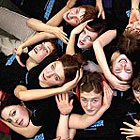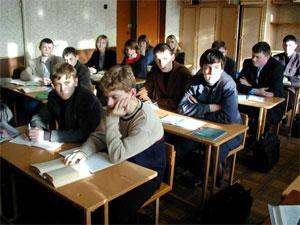Russian teenagers' early experience in sex infuriates teachers
Teenagers tend to be overly showy and exaggerate when talking about sex
A Moscow school teacher once heard her pupils talking during a bus ride. Horror was in her eyes as she related the story to her colleagues. “Just imagine those young bastards discussing in detail sexual relations with their classmates!” said she and gasped in indignation. 
A parents' meeting convened shortly after the bus ride story. Many a father and mother were shocked to know the news about their sons and daughters. The parents apparently had no idea that their boys and girls, those sweet angels looking very domestic and innocent, were no strangers to sex.
A study by the Center of Sociology under the Russian Academy of Education is based on the opinion polls involving 3,000 pupils of seventh, ninths, and eleventh grades. The study sheds light on many problems faced by teenagers including sexual behavior.
Doctor of psychological sciences, academician of the Russian Academy of Sciences, Vladimir Sobkin, said that the school children were asked the following question during the poll: “What is your attitude to sexual relations between teenagers of your age?" There were four different types of the answer to choose from. The first one reads: “I believe that sexual relations are not permissible at my age, I do not have a sex life.” The poll results show that 36.2 percent of the pupils chose to tick the first type. The second type reads: “I believe that sexual relations are quite permissible at my age though I do not have a sex life.” The second type was chosen by 37.2 percent of the polled. The third type of the answer enables us to reveal those who consider live through sexual relations as a conflict. The teenagers of that group (3.7 percent) realize that they do bad things in respect of generally accepted morals but do them anyway. The third variant reads: “I understand that it is too early to have a sexual relationship at my age, but nevertheless I have a sex life.” In the meantime, 12.2 percent of pupils believe sexual relations at their age are perfectly natural. They all admit to having a sex life.
Academician Vladimir Sobkin believes that the results of the poll are quite objective. Needless to say, teenagers tend to be overly showy and exaggerate when talking about sex. However, the results of the school children poll fully agreed with the results of polls involving students who answered questions on their attitudes to sex back at school.
The study shows the change of attitude to the “age-prohibitive standard” as teenagers grow older. Boys and girls alike start thinking differently about the above subject as they enter the ninth grade. The number of teenagers who do not have any sex life yet consent to other kids of the same age having sex is on the increase in ninth grade. There is also an increase in the number of those who had sexual experiences. Only 2.5 percent of girls and 6.6 percent of boys reported to have had sex in seventh grade while 11.9 percent of girls and 28.2 percent of boys reported to have had sex in ninth grade. The figures are even higher with regard to eleventh grade, 35.6 percent of girls and 55.4 percent of young men. The study covers sexual intercourses between steady partners on a regular basis, and occasional sex experiences.
Parents will be panicking after reading the study. Well, this is what they should be doing. It is high time they paid attention to their sons and daughters after school.There are hundreds ofbooks on a difficult period of time called “adolescence,” psychological characteristics of the teenager who normally goes through a gamut of thoughts and emotions about himself at that stage of development. The teenager is concerned with opinions about himself other people have. But his mom and dad are always busy. They seem to have forgotten completely how it felt being a teenager in their time. They do not even try to have a heart-to-heart talk with their offspring who are going through changes.
“All those emotions, doubts, fears and expectations coming over a teenager when he or she is charged with excitement because of the other person for the first time are beautiful. In my opinion, an adult who is unable to handle it with care is tactless person without a gift for pedagogy.
 What can our children see on TV screen each day? It is mostly erotic films and shows smacking of porn and occasional vulgarity. It purports to be viewed as some kind of pattern of a normal relationship between a man and a woman. But there are no relations whatsoever in those shows and films. Only the bodies assuming positions as told. When teachers and parents blame the TV bosses for promoting sex, they fire back using a usual formula: “Switch it off if you don't like it.” An adult will probably follow that piece of advice while a teenager will keep on watching because he is very sex-conscious at the moment. Incidentally, TV shows, advertisement, and friends are the main educators of teenagers in terms of safe sex. Parents sit in the fourth position.
What can our children see on TV screen each day? It is mostly erotic films and shows smacking of porn and occasional vulgarity. It purports to be viewed as some kind of pattern of a normal relationship between a man and a woman. But there are no relations whatsoever in those shows and films. Only the bodies assuming positions as told. When teachers and parents blame the TV bosses for promoting sex, they fire back using a usual formula: “Switch it off if you don't like it.” An adult will probably follow that piece of advice while a teenager will keep on watching because he is very sex-conscious at the moment. Incidentally, TV shows, advertisement, and friends are the main educators of teenagers in terms of safe sex. Parents sit in the fourth position.
“Does your mother know that you have a sex life?” 36.5 percent of the poll participants gave a negative answer to the question, “no, I keep it dark.” The number of respondents concealing their sex life from their fathers is a little bit greater – 37.7 percent. Only 19 percent of mothers and 17.3 percent of fathers are aware of sex experiences of their children, and they are tolerant of the situation.
However, there is still a couple of reasons to be optimistic about the relations between children and parents. One of the questions in the poll read: “Who should you talk to if you have been raped?” 55.6 percent of the kids said they should talk to their parents first.
When asked by a Trud correspondent whether a sex education course should be taught at school, Mr. Sobkin said:
“The subject is very complex and delicate. It can be easily distorted and vulgarized by poor teaching methods, you know, the whole class just goes giggling. So I strongly object to this kind of “education” at school. At the same time I believe that we should launch educational programs concerning safe sex, adolescent pregnancy, STDs. The above topics, I repeat, should be discussed outside the school class, teachers should not be involved in the programs. We should refer the problems to specially trained family advisers and psychologists.”
“Psychology is a subject that is really missing in today's school programs. It was taught at the secondary schools in the Soviet Union before the war. By the way, the kids studied logic back then. Nowadays children are taught a lot of things about inorganic nature, they also get some knowledge about human physiology. On the other hand, their textbooks can not tell them about emotions and feelings, reason, and ways to control emotions,” said Mr. Sobkin.
Discuss this article on Pravda.Ru ENGLISH FORUM
Subscribe to Pravda.Ru Telegram channel, Facebook, RSS!



